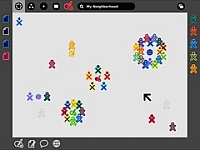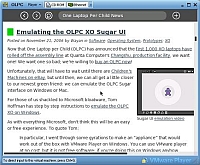My name is Christoph Derndorfer and I previously wrote about OLPC videos at CES in January. Now, while I was sitting here in Barcelona video-less, I'm reading through OLPC News and the interesting points that people raised since then about One Laptop Per Child.
In my exploration, I do keep wondering why so little discussion has been about the machines itself lately. Everyone seems to be focusing on the impact OLPC production will have on Taiwan's IT industry, why the XO won't be coming to US schools anytime soon and a billion other questions *surrounding* the project.
When was the last time anyone actually mentioned the children and teachers that are going to be using the Children's Machine XO? How many children and teachers have actually used the Sugar UI?
We all know that geeks (yes, I'm also guilty of belonging to that group of people) find the user interface very interesting. But has anyone done any large scale usability testing of the hardware and/or software with children in developing countries? Or any children at all?
Why does it seem to make sense to send out the latest batch of OLPC XO BTest-2 laptops to developers when none of the millions of people who are supposed to be using this computer by the end of the year has ever used one? Was my professor in User Interface Design wrong when he suggested that it makes a lot of sense to review the user experience early on in the development process?
Has anyone considered the fact that a bunch relatively well-off, well educated Western developers with decades of computer experience are writing software for people who have a very different view of the world and also use different mental models throughout their daily life?
Most of OLPC's job descriptions include something about "frequent travels to Asia" because that's where the hardware manufacturers are located. Wouldn't it make more sense to look for people who are "willing to spend a significant amount of time in remote areas of the world" with 20 B2 machines and a classroom full of students?
Don't get me wrong, OLPC environmental issues are important just like the question of Quanta's working conditions for its employees.
But the core issue at hand here is whether OLPC succeeds in providing an effective educational tool with the Children's Machine X0. And I don't see that happening unless the project starts spending more time with the people who are supposed to be using the OLPC X0.




Some good questions, Christoph.
For those who are interested, here are the gui guidelines:
http://wiki.laptop.org/go/OLPC_Human_Interface_Guidelines
The OS and software can always be improved and changed. There could be light versions of Ubuntu, Fedora, Pepper, Puppy, even a light version of Windows XP or whatever OS could be installed on it in the future, by a simple process of inserting a bottable SD card.
There is no question about Laptops being usefull just in their nature of being laptops, meaning portable foldable electronics, with a screen, keyboard, mouse-pad and software to browse the Internet with Wi-Fi. Now this is the most basic thing that simply needs to work, and if they can achieve this for less than 150$, then it's already a huge success.
All additionnal perfections of the Sugar OS, or other more traditionnal OS looking implementation (I'm sure there are 12 suitable OS in the works), because all the software, I think, can easilly be ported from one OS implementation to the other. It's just a question to make an OS that boots really fast, loads applications fast, and really tries to make much more sence that traditionnal OS interfaces.
Eduardo, thanks a lot for the link! Looks as though the OLPC folks made some updates since I last looked at it.
Anyway, I think the guidelines are also a rather good example of what I'm talking about. OLPC's concepts of The Journal ("a written documentation of everyday events, understood, albeit in various forms across cultures ... We have chosen to adopt a journal metaphor for the filesystem as our basic approach to file organization.") demonstrates that they spent some time thinking about those mental models (both different and similar) that exist around the world. That same thing holds true for the "activities", "neighbourhood" and other approaches.
But so far these ideas only look good on paper...
Charbax,
I don't think that "The OS and software can always be improved and changed." holds true for the majority of the areas where X0s will be used. We're talking (in part) about very remote and rural areas without access to any kind of decent infrastructure.
These days in the Western IT world we're used to constantly upgrading the firmware or software on all the devices we're using. First it was only Windows on our computers, these days it's our mobile-phones, iPods and tv-receivers, tomorrow it might be your microwave or that cardiac pacemaker.
If I remember correctly Walter Bender mentioned remote upgrades of the firmware or something in one of his latest weekly updates. But I'm still convinced that with the OLPC project it's vitally important to realize that upgrading might not be an easily available option. So basically once delivered the X0 will stay "as is" for extended periods of time.
In April Brazil will be testing 1000 XO machines (as well as 1000 each of the Intel Classmate, Encore Mobilis and off the shelf laptops) in actual classrooms. So the pilot studies that everyone keeps asking for will happen.
The people at LSI-USP (Brazil) have let a group of about 30 children spend a few hours with the machines and found that the OLPC people were right about how easily they would figure things out in contrast with adults.
It is a pity that all tests so far have used USB mice because in my experience some children have problems using trackpads. In addition I expect quite a few of them to have problems with the "tablet mode" since they will be writing in one place while the text/drawing will be appearing in another (even worse: in a different plane). It would be a really good idea to test if children with such problems can overcome them after a day or two of training.
The OLPC XO laptops can be updated, remotely by doing some Wi-Fi transfer from the School server which got the HDD and the faster downlink to the repository. So basically the kid just has to go to school and wait his turn to have his OLPC XO upgraded with the latest OS and software.
Also, a 3$ 512mb SD card can do the trick, the OS and other software simply can be put on such an SD card and all there is to be done to upgrade the firmware is to reboot the device which the SD card is inserted.
So definately yes, OS and other software will be upgradable, that's the whole point of OLPC, and much easier than for Windows XP, that's one of the reasons for choosing to run on a Linux kernel.
Jecel, thanks a lot for the information regarding those tests in Brazil!
Do you happen to know whether the results of these tests will be made available to the public so other countries (aka potential customers) can also gain a better understanding of the X0's usability at this point? Also, did the LSI-USP publish anything about that session with the 30 children? Or was it more of an informal kind of test?
Your last sentence actually brought up a very good question: How much "training" are children going to be receiving anyway? I know OLPC is all about constructivism and stuff but I'm convinced that most users will need some sort of introduction to the whole machine to kick-start their experience.
Charbax, I'd love to believe that software upgrades will be as painless as you describe them. Apart from the infrastructure itself there are also a ton of interesting technical issues that are involved. Repositories, package dependencies, CVS and these things are nice for people who know how to use them. But how are you going to ensure that customized activities or completely new activities that the users came up with (constructivism at its best!) aren't broken by an update to a libary or something? Who will be responsible for keeping everyone's X0 up-to-date, the OLPC foundation, the countries themselves, the schools, the teachers,...? Who decides whether a newly created activity is integrated into the base system? When is a new activity "stable" enough to be installed on a million machines? Will Sugar have an option where users can decide whether they want to "send bug reports and crash logs to OLPC so we can improve your software"? Tons of other questions come to mind...
To conclude: I simply haven't seen enough information about that topic (anyone happens to know how these school-server are coming along? it's been quite a while since I last heard about them and OLPC's website doesn't contain too much information on them either) to be able to make any real judgement. Having said that I remain skeptical on this issue until a viable solution has been demonstrated. "guilty until proven innocent" if you will...
Two interesting and relevant excerpts from Walter Bender's community-news mailing list which was sent out earlier today:
"1. Abuja, Nigeria: A significant milestone was reached when approximately one- hundred laptops were handed out to children in Nigerian test school, Galadima. The laptops were received with smiles, curiosity, and giggles. The most popular feature in the first hour the children spent with their laptops was the mesh view. As of this moment, one-hundred families in the Nigerian Galadima community will have spent part of their family time around the laptops, with the children proudly explaining how they work."
- Again, this is nice a sort of a milestone or something. But I'd like to hear more about the usability. Do children really know how the X0s work after so little time?
"11. School server: The software architecture of the school servers is starting to come together, through discussions this week around the networking services provided and possible scaling mechanisms. For Trial-1, the networking will remain IPv4, with the school server providing DHCP, DNS, HTTP cache, and NAT functionality. Hardware for school server development has arrived in Cambridge, with plans to have a limited prototype up and running over the next week."
- Finally we're hearing something about the school servers! Hope to learn more on it in next week's update, especially what kind of hardware and software choices OLPC is making!